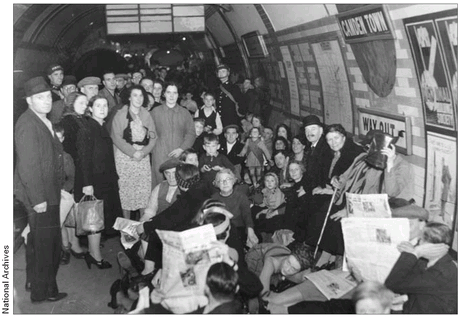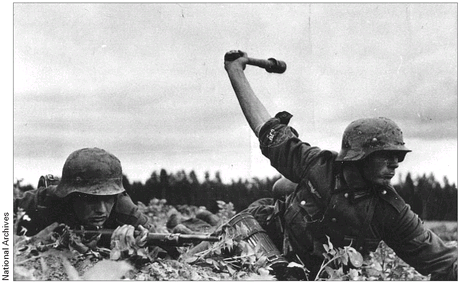War Stories III (7 page)
Authors: Oliver L. North

Prevailing in the Battle of Britain and the Blitz that followed required not only dedication and patriotism, but a highly sophisticated air defense network. The RAF “chain home” radars were connected to a system of ground observers and air raid wardens who fed information into an integrated warning and control center headquartered at Uxbridge, just west of London.
The British also organized a remarkably effective civil defense structure to mitigate the effects of the German bombings. The fire brigades, rescue squads, medical personnel, air raid wardens, and explosive ordnance disposal units deployed in Britain's cities often made the difference between living and dying for those on the ground.
Nineteen-year-old Charles Leah wanted to enlist in the armyâbut with his three older brothers already in the military, his mother pleaded, “I've given up three sons . . . and that's more than any mother should be allowed to suffer.” So instead Leah volunteered to be an air raid warden in his hometown of Coventry, ninety-five miles north of London.
CHARLES LEAH, AIR RAID WARDEN
Bellgreen, Coventry, England
30 September 1940
30 September 1940

I was born and brought up in Bellgreen, on the outskirts of Coventry. In 1938, everybody in England expected the war with Germany. Prime Minister Chamberlain went over to Munich and came back waving a piece of paper and said, “Peace in our time!” which nobody believed. But it gave us a bit of time to prepare anyway.
My three older brothers all joined the forcesâone went to the Navy, two in the Army. When the war started in 1939, I was going to join but my mother appealed to me to stay home so I joined the Air Raid Precautions organization. She thought my only job was to watch over a section of our neighborhood, the streets around our area.
But I didn't tell my mum what an ARP warden does during a raid. If bombs come down, the ARP has to log where they fall. If they're already explodedâit's not a problem. But if they are unexploded, or have a delay fuse, it can be a bit dangerous. My mum thought that all I did during the war was to make sure people observe the blackout, and not show any light.
In the summer of '40, the German bombers came over the Channel, over Kent, Norfolk, and the coastal areas. That's where most of the dogfights took place in the attempt to stop them from getting in over our cities. And, of course our anti-aircraft guns would try and shoot them down, which they did often.
In August of '40, I was by the Jaguar Standard Motor Works and this solitary plane flew over. Nobody realized it wasn't an English plane until it was about quarter mile away and it suddenly dropped two bombs onto the motor works. One bomb hit the paint shop, and there was an explosion and this huge plume of black smoke. The plane went off flying low, to get away, but an AA battery shot him down.
Â
Londoners taking shelter in the Underground.

We'd get a bit worried with the anti-aircraft guns shooting into the air because everything comes back down again, in little bits and pieces of shrapnel, and they would hit your helmet like rain. Late in the summer a German bomber dropped a load of incendiaries not far from my home and the public library burned down.
In September of '40 the Germans started what we called the “Blitz”âgoing after civilians in our cities. Then we had raids practically every nightâthe sirens would go and planes would come, and drop their bombs and head off again.
In one of them, on November 14, I was at a place called Tile Hill. I had to walk to my home, and then down to the ARP station, about three miles. On my way to the ARP post, I came across a neighbor, Mr. Gough, who was leaning against a fence and groaning. Obviously something was wrong. I asked him, “Are you all right?” And then I said, “Come on, I'll take you down to shelter.” But when I picked him up, he groaned, and died in my arms.
One night the phones were down so I sent my runner to find out why. It's a very old-fashioned way of doing things, but it works. He was gone for some time so I decided to go out and look for him. About three hundred yards from the ARP station, I heard four bombs coming down, so I dove into the gutter, where there was a little bit of cover. One of the bombs landed on the other side of the hedge where I was.
Further down the street I found that the second bomb had killed Gordon, our seventeen-year-old runner. A third bomb had come through the center of three connected houses and wrecked them. I went inside one and found a father and his little girlâdead of course. I lifted the man out of the wreckage and laid him on the kitchen floor. Then I went and fetched the little girl, and laid her alongside daddy. And then I got the wife outâall of them dead.
A few minutes later I heard the last bomb explode. It had landed on the bay of my parents' house, where I also lived. It had a delay fuse. The Germans did that so they could kill as many rescue workers as possible. When this bomb went off it pushed out the bay, and the center wall fell,
and everything was piled in the back. The ceilings were all falling down into the bedroomsâthere was nothing holding them up.
and everything was piled in the back. The ceilings were all falling down into the bedroomsâthere was nothing holding them up.
I went around to our shelter, and thankfully my parents were inside. They asked, “What is it like?” They had heard our house had been hit, but didn't know how bad. I said, “Yeah, it's pretty bad.” But we were all safe and alive.
I think everybody was proud of the RAF, and what it did. Imagine, kids of nineteen or twenty going up in a Spitfire, facing hundreds of German planes, with only a couple, a weeks' training in some little trainer. Yeah, it took gutsâespecially in light of some terrible losses.

Hitler's deeply flawed decision to shift from bombing the RAF Fighter Command bases to terror bombing of British cities in September of 1940 is the turning point in the Battle of Britain. Though no single document survives to explain his rationale, most historians surmise that it was the consequence of a navigational error.
On the night of 24 August 1940, a ten-plane flight of He-111s, aiming to hit the piers on the lower Thames, overshot their target and dropped their bombs on the center of London, killing scores of civilians. The next night, RAF Bomber Command launched an eighty-plane raid on Berlinâthe first against the German capital. Five days later, the Führer lifted his ban on “terror bombing” and urged Goering to “destroy” London.
Within a week of this decision, the Blitz was onâand Hitler was preparing to abandon Sea Lion, his plan for the invasion of England. On 14 Septemberâthe day after Mussolini launched the invasion of Egypt from Italian bases in LibyaâHitler postponed Sea Lion and on 12 October, he permanently cancelled the operation. By then, the RAF had recovered sufficiently to inflict horrific losses on the Luftwaffe bomber crews conducting daylight attacks and in November, Goering ordered that all major cross-channel raids would be conducted at night.
In describing the role of the RAF in this bloody contest, Prime Minister Winston Churchill told the House of Commons on 20 August, “Never in the field of human conflict was so much owed by so many to so few.”
They were few indeed. By the end of September, RAF Fighter Command had lost more than 850 fighters knocking down 600 German bombers. Fewer than 2,500 RAF fighter pilotsâamong them a handful of Canadians, Australians, New Zealanders, Poles, Free French, Czechs, South Africans, and Americansâhad handed Hitler his first defeat.
Thanks to their courage, by the winter of 1940â41 Churchill no longer had to worry about a German invasion. Instead he began to focus on how to turn his island nation into a springboard for a joint British-American return to the Continent.
Hitler, thwarted in his hope for a neutral or defeated England, turned his attention to a new adventure: crushing the “Bolshevik menace” by means of Operation Barbarossa, the invasion of the Soviet Union.
CHAPTER 3
THE EASTERN FRONT 1939â1941
H
itler's 12 October 1940 decision to cancel Operation Sea Lionâthe invasion of Englandâwas predicated on the inability of the Luftwaffe to gain air superiority over the British Isles. But even before his conclusion that a cross-channel operation was impossible, the Führer had already begun exploring other options and opportunities. In mid-August he had raised the prospect of taking on the “Bolshevik menace” with his military commandersâsuggesting that a campaign against the Soviets would be necessary in order to secure Germany's eastern frontier.
itler's 12 October 1940 decision to cancel Operation Sea Lionâthe invasion of Englandâwas predicated on the inability of the Luftwaffe to gain air superiority over the British Isles. But even before his conclusion that a cross-channel operation was impossible, the Führer had already begun exploring other options and opportunities. In mid-August he had raised the prospect of taking on the “Bolshevik menace” with his military commandersâsuggesting that a campaign against the Soviets would be necessary in order to secure Germany's eastern frontier.
On 2 September he signed a new Tripartite Pact with Italy and Japanâin which they all pledged to aid one another in the event of an attack on any signatory. Eleven days later, Mussolini launched an assault into Egypt from Italian bases in Libyaâprompting Hitler to meet with Il Duce on 4 October at the Brenner Pass in the Alps. There, the two fascist dictators concocted a plan for bringing Franco's Spain into the Axisâand seizing all British territories in the Mediterranean from Gibraltar east to Suez.
Hitler took
Amerika,
his specially configured “command train,” for the meeting with the Spanish dictator on 23 October. But Franco was unimpressedâand rejected the idea of allowing the Wehrmacht to transit
Spanish territory in order to attack Gibraltar. Frustrated in his grand design for turning the Mediterranean into an Axis-controlled lake, Hitler returned to Berlinâonly to learn that Mussolini, without consulting anyone, had invaded Greece.
Amerika,
his specially configured “command train,” for the meeting with the Spanish dictator on 23 October. But Franco was unimpressedâand rejected the idea of allowing the Wehrmacht to transit
Spanish territory in order to attack Gibraltar. Frustrated in his grand design for turning the Mediterranean into an Axis-controlled lake, Hitler returned to Berlinâonly to learn that Mussolini, without consulting anyone, had invaded Greece.
Â
Hitler launched nearly four million Wehrmacht troops into Russia in Operation Barbarossa on June 22, 1941.

By the first week of November 1940, Adolf Hitler was on the sidelines of world events for the first time in three years. Mussolini's Italian “Legions” were charging pell-mell across the Egyptian desert toward Suez, and his “Alpine Army” was promising to seize Athens by the middle of the month. The Russians were moving more troops into Estonia, Latvia, and Lithuaniaâas they were permitted to do under the 1939 Molotov-Ribbentrop Pact.
Other books
Emily Carr by Lewis Desoto
Witches Incorporated by K.E. Mills
Department 57: Rubies of Fire by Lynne Connolly
Whatever Tomorrow Brings (The Californians 1) by Lori Wick
The Second Shot by Anthony Berkeley
Undertow by Elizabeth O'Roark
Wicked Burn by Rebecca Zanetti
All or Nothing by Dee Tenorio
No Hero by Mallory Kane